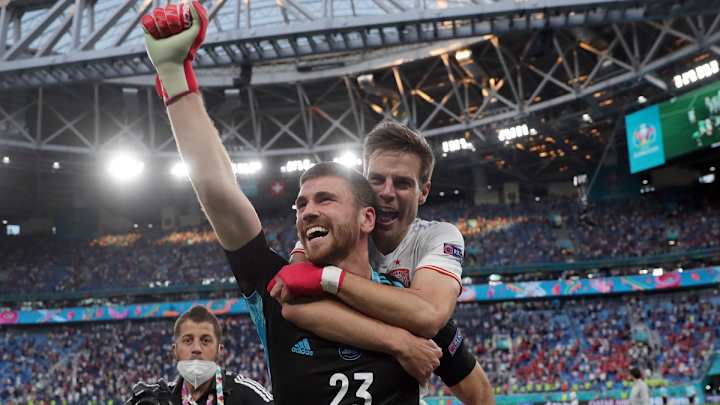Spain, Switzerland and the Two Sides of Penalty Kick Emotion

You'll forgive Spain and Switzerland for running out of their precision, dynamism and thrills after using up so much in the round of 16 at Euro 2020. In their quarterfinal Friday, Spain progressed and will face familiar foe Italy in the semifinals, but the battle of the two winners of the astonishing third day of the last round, when 14 goals were shared across the two games, felt, perhaps inevitably, anticlimactic. Playing against 10 men for 42 minutes, Spain could not find a winner, but scraped through an astonishingly anxious penalty shootout, 3–1, after a 1–1 draw through extra time.
It was, though, a victory that left more questions than answers. After scoring five goals in each of its last two games, and taking an early lead, Spain lapsed back into the stodgy plodding that had characterized its play early in the tournament. The Swiss, meanwhile, having survived the shootout, suffered an astonishing failure of nerve.
Sergio Busquets hit the post with the first kick—another miss for Spain after five straight failures in normal play—but it turned out the Swiss were even more fallible. Three straight misses and stout goalkeeping from Unai Simón allowed Mikel Oyarzabal to finish off Spain's progression to the semifinals, robbing the Swiss of a stage it'd yet to reach in its history.
They very nearly got there, though, despite some limiting circumstances. Denis Zakaria was always going to have a difficult task filling in for the suspended Granit Xhaka, who had been exceptional in the penalty shootout victory over France. The Borussia Monchengladbach midfielder could have done with a straightforward start to ease him into the game, but instead, after eight minutes, he wagged an ineffectual foot at Jordi Alba’s speculative effort on the volley as Switzerland half-cleared a corner, deflecting it just inside the post. If Spain is now scoring from corners, albeit via the 10th own goal of the tournament (the key figure in the ninth own goal, Simón, would go on to continue his redemption tour), it’s safe to say the drought of the first two group games is over, and the Luis Enrique revolution is well underway.
There was a sense for Switzerland in the first half of its luck having run out. Already without Xhaka, it lost Breel Embolo to a hamstring injury midway through the opening 45, and with him a lot of its drive on the counter. Having looked so threatening against both Turkey and France, this was back to the blunt Switzerland that had become familiar at major tournaments. Perhaps that was because the absence of Xhaka slowed the transit of the ball from back to front. Perhaps it was because Spain put pressure on in a way neither Turkey nor France (in the first half) had. Or perhaps it was because Spain did not leave space behind its fullbacks for the Swiss wingbacks to exploit.
But the lesson from that France game is that this Swiss side is capable of coming back from the severest of blows. If you’re not beaten having missed a penalty to go 2–0 up and then having conceded three second-half goals, then you’re not beaten by being 1–0 down at halftime. Just after the hour mark, Steven Zuber, surging forward from left wingback, drew a fine save at his near post from Simón.
That should have been a warning for Spain, which had seemed to be in control. But this is not a Spanish defense that responds well to pressure. Pau Torres and Aymeric Laporte somehow surrendered passion to Remo Freuler, who nipped between them and squared for Xherdan Shaqiri to stroke the equalizer into the bottom corner.
Spain wobbled, stabilized and was then dealt a moment of extraordinary fortune as Freuler was very harshly sent off for a foul on Gerard Moreno. Referee Michael Oliver presumably saw that he had gone in with his left foot high and a slight scissoring motion, but the lack of real force in the challenge seemed to be a mitigating factor.
If the expectation had been of a barrage of Spanish pressure, though, it did not come. The lack of incisiveness that had been apparent in those two opening group games was apparent again. Koke, in those circumstances, is the midfielder who always looks limited, a diligent scurrying player, but not a slick creator in the manner of Pedri or a Xavi or an Andrés Iniesta.
And perhaps Spain also missed Álvaro Morata, who was withdrawn for Moreno 10 minutes into the second half. His frequent misses have brought derision, but Morata does help create chances and link play; without him Spain looked a little ragged. And Moreno then started missing chances of his own, firing Alba’s cross wide and clumping a close-range volley straight at Yann Sommer in the Swiss goal, one of the 10 saves the heroic goalkeeper made on the day in Russia. Suddenly, the Luis Enrique revolution looked as though it had barely begun. There was a lot that was sideways, a lot that didn’t go very far and not a huge amount of penetration. Spain has completed more than 2,000 more passes than England during this tournament (albeit having played a game more).
And so the Swiss, well-organized and resolute, held out for penalties, having scored all five in the shootout against France, while Spain carried its horrid run into the quarterfinals, already having been stifled from the spot during this tournament. Penalties can be quite two-faced, though. The thrill the Swiss experienced just days ago turned to immediate pain and an abrupt elimination, while Spain overcame its hoodoo from 12 yards out to keep its quest at a record-fourth European title alive.
More Euro 2020 Coverage:

An accomplished author of multiple books, Jonathan Wilson is one of the world’s preeminent minds on soccer tactics and history.